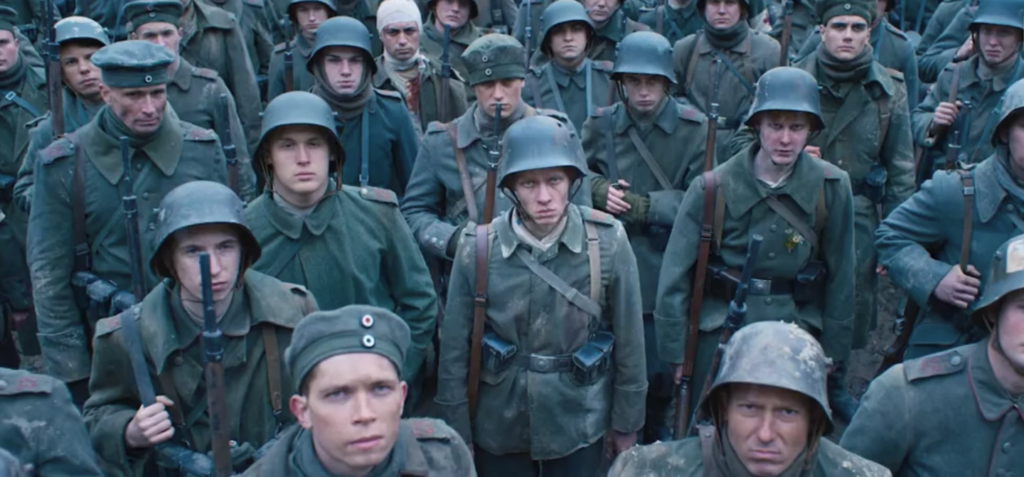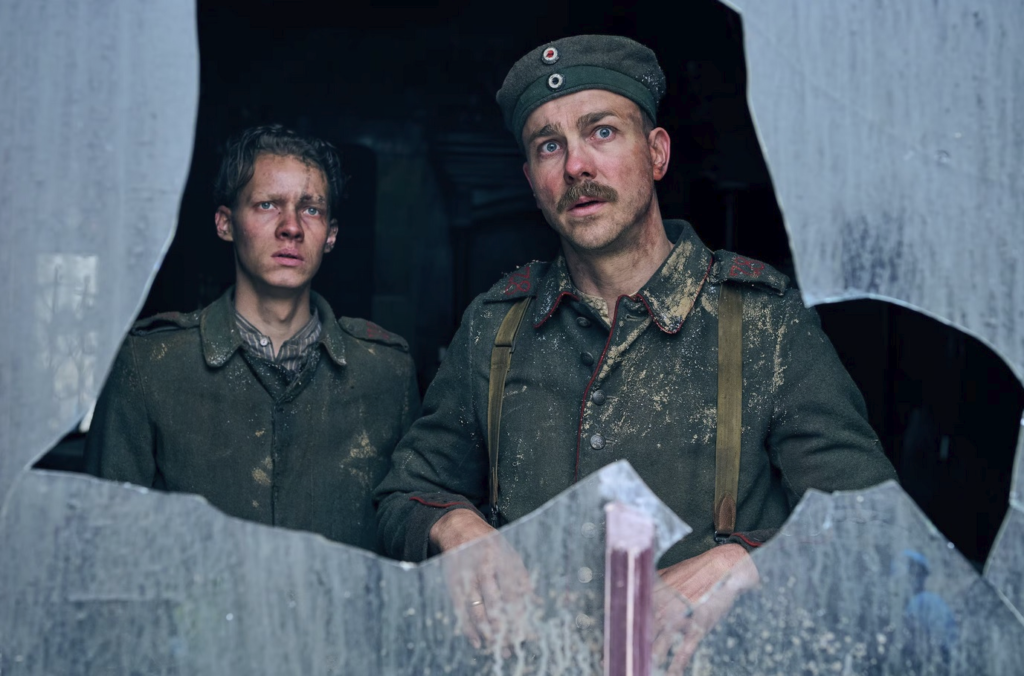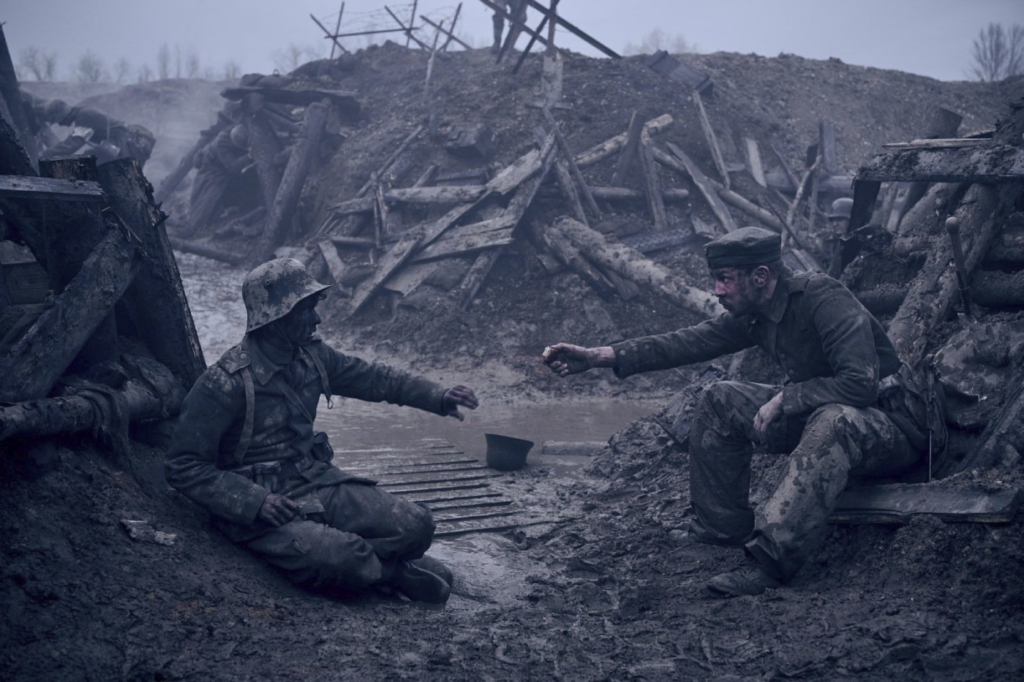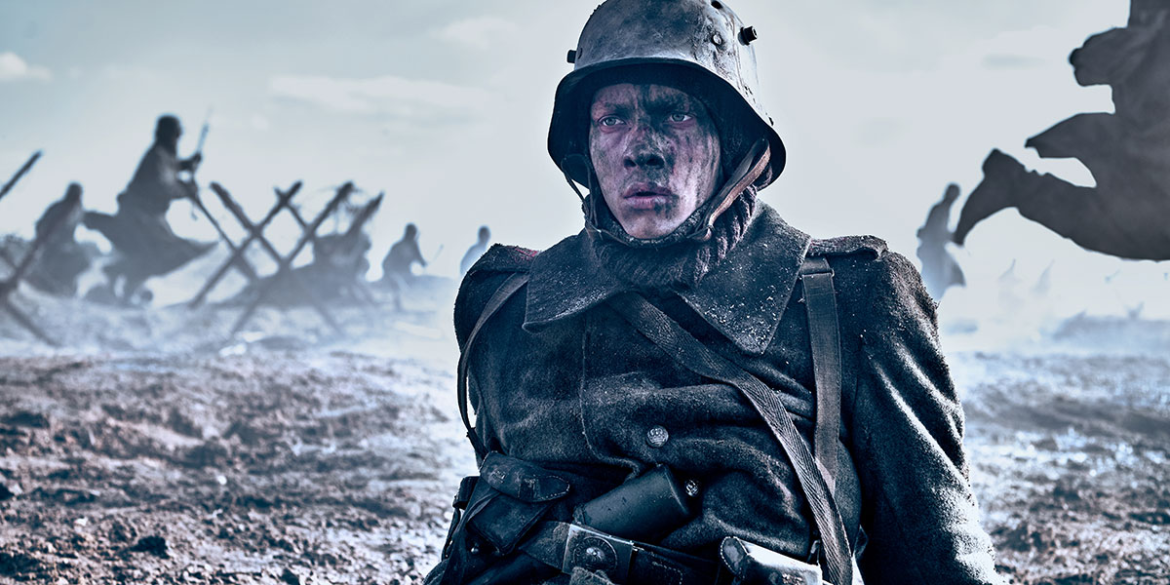Based on the 1929 book by German WWI veteran Erich Maria Remarque, All Quiet on the Western Front (All Quiet for short) paints a gripping story of everyday trench life during The Great War from the German perspective. It is a horrific tale of how a brotherhood of patriots can be withered down one by one until they are eliminated by war.

There have been several adaptations in the past, the most famous of them from 1930 – which was notoriously banned by the Nazis. There was also a TV movie adaptation In 1979 realized by CBS. However, despite these films about the german side neither of these films stared German actors or speak the language. These were films made to cater to American audiences.
The Latest adaptation by Netflix has been produced this time with authenticity in mind, not just the battles, but in the German language, as it was always meant to be. As a war film, this latest version of All Quiet captures every aspect of the viciousness and carnage of the WWI battlefield on camera.

There were however several problems that keep this reviewer from giving it a solid 10/10.
Many book readers have criticized it for the jumping of the timelines and additional scenes like the ceasefire negotiations that felt unnecessary to some viewers. For me, however, my biggest criticism against All Quiet is how a few select notes from composer Volker Bertelmann came close to undermining the integrity of this movie.
The Score Problem

When it comes to this kind of grim storytelling, the best hard-watch survival film either has no soundtrack or is so distinct that you always connect with it. The Revenant and Schindler’s List come to mind.
In All Quiet, the score is mainly kept to a minimum. However, the recurring track has a bass that makes a distinctive Hans Zimmer-like boom every time there’s a sense of dread or foreshadowing. From uniforms of dead soldiers being recycled to young soldiers marching or the new general traveling to his headquarters.
The problem with the bass is that it doesn’t match the tone this movie is trying to portray. Such sound is meant to get you hyped for a battle; it should not be used in a film about the misery of war that the original source material was about.

In my opinion, this kind of film doesn’t need a musical score, a more minimalist take like those in The Revenant or 12 Years a Slave would fit far better. What those films have in common was they were both about survival and looking for reason in a bleak world. When your musical score doesn’t match that, it takes you away from the very themes that this movie claims to be about.
For one, this kind of composition doesn’t match the time period. There is a reason they don’t put rock music in world war two films. This style of music only works in a period drama if you have a specific style that accommodates it.
Using Modern Music Right
Quentin Tarantino, for example, has a rap take in his slave vengeance film, Django Unchained.
It works in Django because Tarantino has a style with a modern lens that’s meant to be taken less seriously. Therefore, the score matches the tone appropriately. If they put this in 12 Years a Slave, not only would it not match the setting but also would relegate the horrifying scene into a meme.

And that is the problem that All Quiet has been punched into. It clearly wants to portray the horrors of war, but the score’s tone does the exact opposite, making you almost feel almost hyped to see the carnage.
All Quiet on the Western Front is meant to be a serious hard watch through and through like the Soviet film Come and See. The reason these films’ scores are kept to a minimum is to elevate how real these scenes get. When people are shot, stabbed, or mutilated you feel everything.
The main problem is that the sound blast will get you excited about what’s coming – not make you dread death and despair. Far from anti-war, this is the most pro-war kind of music you can expect patriotic propaganda.
Conclusion

This tangent makes it sound like I hated this film, and that’s not true. All Quiet on the is a very Good War film that captures every horror of this century-old conflict. It was simply a few ill-conceived notes that prevented me from rating this film higher.

This could have been one of the Great War films on par with 1917 and Saving Private Ryan based on a very important book that was so counter to the idea of patriotism and military service that Hitler banned it.

Every film needs a consistent tone, especially about the horrors of war. And when a few musical notes undermine the very message your trying to tell. In a nutshell: it is far more powerful to show those horrors with an eerie violin than with an electric guitar.




